Angular Cheilitis Causes
Learn exactly what causes angular cheilitis, why it makes your lips crack, and while some people suffer from angular cheilitis more frequently than others.What Angular Cheilitis Really Is
 Angular cheilitis is a bacterial, fungal, or bacterial and fungal infection on one or both sides of your mouth. This bacteria and fungus is naturally present on healthy people, but is usually kept under control by our body's immune system. However, if our immune system is weakened or if we have any type of mouth trauma it can make it easier for the bacteria and/or fungus that causes angular cheilitis to spread Learn if angular cheilitis can spread to other parts of your body..
Angular cheilitis is a bacterial, fungal, or bacterial and fungal infection on one or both sides of your mouth. This bacteria and fungus is naturally present on healthy people, but is usually kept under control by our body's immune system. However, if our immune system is weakened or if we have any type of mouth trauma it can make it easier for the bacteria and/or fungus that causes angular cheilitis to spread Learn if angular cheilitis can spread to other parts of your body..
What Causes Angular Cheilitis
Vitamin Deficiencies Do Not Cause Angular CheilitisMany people and websites state that vitamin deficiencies (mostly a Vitamin-B deficiency) is the cause of angular cheilitis. While B vitamins do help support the immune system and skin health, the lack of vitamins does not cause angular cheilitis. This was proven in a study performed by the New Hanover Regional Medical Center in 2005.
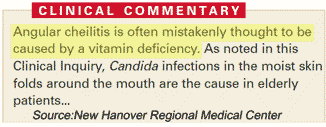 Instead, a lack of vitamins makes the body's immune system weaker which makes it more prone to illnesses such as angular cheilitis. Unfortunately, many individuals still believe that a vitamin deficiency causes angular cheilitis which is not true.
The True Cause of Angular Cheilitis
Instead, a lack of vitamins makes the body's immune system weaker which makes it more prone to illnesses such as angular cheilitis. Unfortunately, many individuals still believe that a vitamin deficiency causes angular cheilitis which is not true.
The True Cause of Angular CheilitisWhile researchers are not completely sure what the exact cause of angular cheilitis is, they do know it is caused by bacteria and/or fungus. The bacteria/fungus that causes angular cheilitis is naturally present in our saliva and on our face, however our immune systems are generally healthy enough to keep the bacteria/fungus under control without it spreading.
Generally, when our body is ill or under stress it negatively affects our immune system. A weakened immune system by itself will not cause angular cheilitis. However, if you have any recent mouth trauma, chapped lips, excess drool or saliva, or deep skin creases in the corners of your mouth it makes it easier for the bacteria/fungus to spread and reproduce.
This following list is a collection of possible circumstances that can cause angular cheilitis.
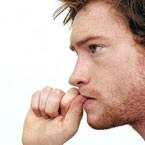 Spread of Bacteria – These things cause the bacteria to spread from your mouth/face to your lips.
Spread of Bacteria – These things cause the bacteria to spread from your mouth/face to your lips.
- Touching your lips with dirty hands/fingers
- Chewing on random items (pens, fingernails, etc.)
- Drooling (when sleeping, eating, etc.)
- Applying chapstick, lipstick, gloss, or any other substance to your lips
Weakened Immune System - The following things can make it more difficult for your body's immune system to stop angular cheilitis.
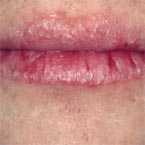
- Chapped lips
- Dental work
- Stress
- Illness
- Frequent vomiting
- Physical injuries (on the face or mouth)
- Sunburn (on/around the face)
- Malnourishment (fasting, poor dieting, lack of vitamins/minerals)
Why Does it Only Affect & Split the Mouth Corners
The bacteria/fungus thrives in areas where there is constant moisture and since the corners of our mouth move so much there are many skin folds and/or creases for the bacteria/fungus to survive.As the bacteria/fungus gets stronger it will weaken and kill the skin cells around it causing the skin to start to flake off. When our body's immune system attacks the bacteria/fungus it will cause the affected areas to become inflamed and swollen.
The combination of inflammation, flaking skin, and constant movement of your lips makes it very easy for the corners of your mouth to begin to crack and split open.
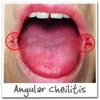 Learn what angular cheilitis is, who it affects, and other general information about it.
Learn what angular cheilitis is, who it affects, and other general information about it. « Go to The Previous Page

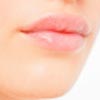 Learn how to treat angular cheilitis, including home remedies, over the counter treatments, and more.
Learn how to treat angular cheilitis, including home remedies, over the counter treatments, and more.